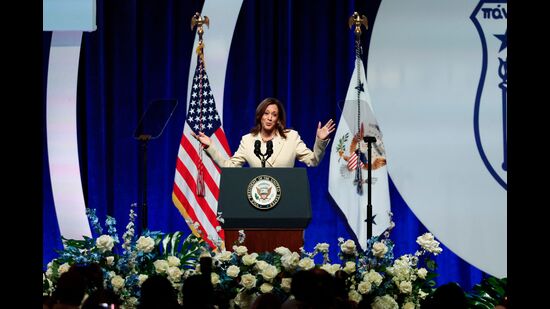Aug 20, 2024 08:54 PM IST
To understand Harris, go back to the movements for justice and freedom, but also to the strand of reform rather than radicalism, that have shaped America
Kamala Harris comes from the finest political traditions embedded in the United States (US), the Caribbean, and India. Irrespective of whether she wins or loses, whether you agree or disagree with her politics, or what you think she means for India-US ties, Harris’s candidacy is a moment to celebrate America’s openness, pluralism, and progress. It is also a moment to reflect on the remarkable connections that exist between anti-colonial, anti-racist, and anti-xenophobic movements across three geographies.

Her father, a Jamaican, and her mother, an Indian, were born when their countries were still a part of the British Empire. Both were inspired by the anti-colonial movements that won their homelands political independence. Harris’s Black father and Brown mother met on a liberal American campus just as the civil rights movement, under the leadership of Martin Luther King Jr, was picking up. They spent time marching at protests and in a study circle that included pioneers of what was to become an academic discipline dedicated to studying Black history.
On the African-American side of her identity, when Harris was born, it was a time when school desegregation had just happened in theory but rarely in practice. The 1964 Civil Rights Act had just been passed, outlawing race-based discrimination a full century after slavery had been abolished — a century in which Blacks continued to be treated as less than human. Voting restrictions still disenfranchised Blacks. And, in the American South, state authorities were still collaborating with White supremacists to violently attack Blacks.
On the Indian side of Harris’s identity, around the time her mother came to the US in 1958, there were just 12,000 Indians in America. A 1917 Act barred Asians from migration; a 1924 law and then national quotas favouring northern Europeans were hurdles too. The hostility to Indians, particularly Hindus and Sikhs, had been most intense in California. It was only a year after Harris was born that the Immigration and Nationality Act was passed in 1965, abolishing national quotas and opening the floodgates for immigration from India.
Now, think of the hidden connections here. If the sun wasn’t setting on the British Empire in the middle of the 20th century, two former subjects of the Empire would probably never have met in another land that had liberated itself from the Crown in the late 18th century. If Mahatma Gandhi hadn’t pioneered satyagraha, Martin Luther King Jr’s civil rights movement wouldn’t have taken the non-violent form it did, which inspired Harris’s parents. If there was no civil rights movement that empowered Blacks, there wouldn’t have been an Immigration Act that opened doors for Indians in America, a debt that liberal Indian-Americans remember; for them, Harris is particularly special given the fusion of these traditions.
Add to this the mood of the 1960s, where American liberalism and conservatism were at war on Vietnam, on welfare, on rights, on the nature of love, on campuses, on the streets, in popular culture, and across institutions.
This was the America that Kamala Harris was born in and the context in which she grew up. This was the America that allowed Harris to feel comfortable with her multiple identities. This was the America that inspired Harris to march against apartheid in South Africa as a student at Howard University in the 1980s. This was also the America where dissenters didn’t necessarily turn to radical militancy but found hope in the Constitution, law, and institutions to create space for the formerly enslaved and currently excluded.
And this is the America that Harris is championing as the America of Donald Trump challenges her. As someone who was both in Milwaukee covering the Republican convention and now is in Chicago covering the Democratic convention, the contrast couldn’t be starker. Trump’s Make America Great Again (MAGA) movement looked like, felt like, and sounded like Make America White Again (MAWA) or Make America Christian Again (MACA). Harris’s party looks like, feels like, and sounds like an America at peace with its breathtaking racial, religious, ethnic, and sexual diversity.
While the historicity of Harris’s candidacy is recognised, what’s not well recognised is that she is an institutionalist. She respects movements and is comfortable with progressives. But she is also someone who is comfortable seeking incremental reforms.
No Communist, as Trump brands her, would go to law school only to become the face of a state’s criminal justice system as a prosecutor and then attorney general. No Communist would become a member of the Senate Intelligence Committee. And no radical would move so quickly to the centre, which Harris did both as vice president and as she is doing today as a presidential candidate on issues ranging from energy to health care. Only a smart politician will.
And that’s why Harris is a product of her times, of the exhilarating era against imperialism and racism that shaped her parents, of the spirit of justice that animated her generation that was also conscious of the perils of extremism, of the professionalism that marks politicians who came of age in the 1990s and 2000s, and of the new liberalism that has placed identity, class, and gender at the centre of politics more recently. And that is why Kamala Harris represents the most honest ideological challenge that the Democrats have posed to Donald Trump. She is the face of the America he doesn’t like. But, this week has shown that America, too, is alive and vibrant.
The views expressed are personal
Story Saved


